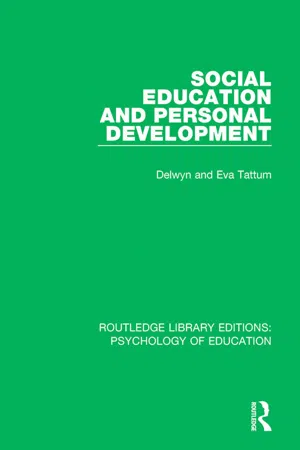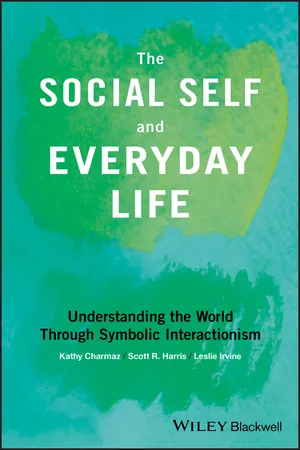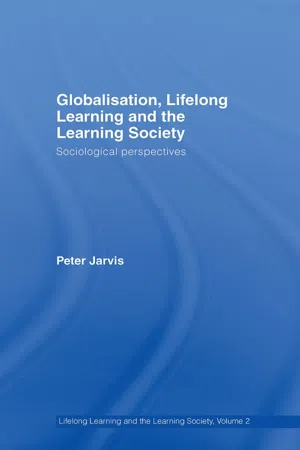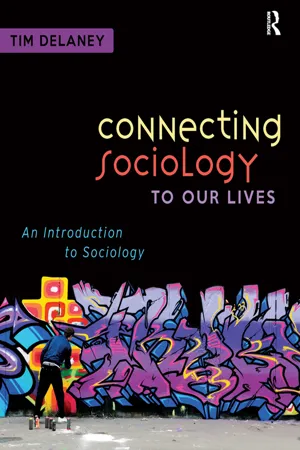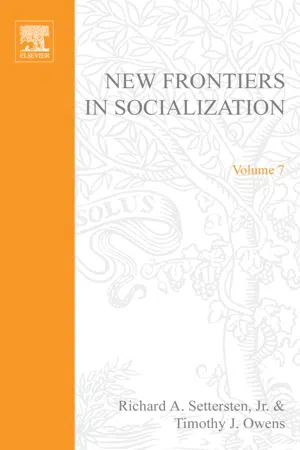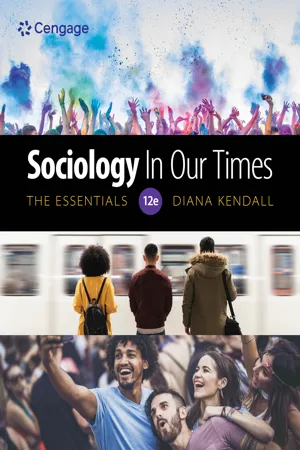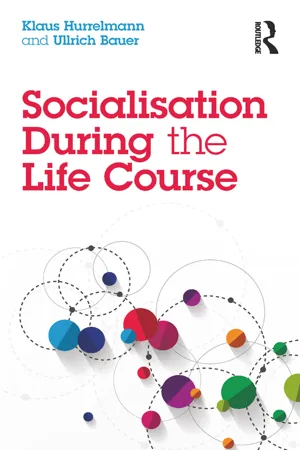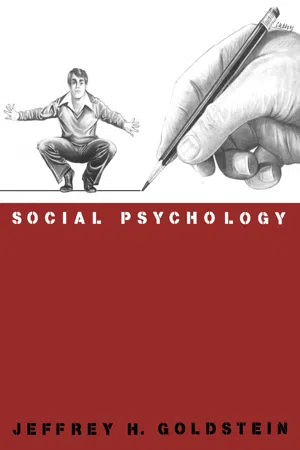Social Sciences
Socialisation
Socialization refers to the lifelong process through which individuals learn and internalize the values, norms, and behaviors of their society or culture. It occurs through interactions with family, peers, schools, media, and other social institutions, shaping an individual's identity and social roles. Socialization is crucial for the development of social skills, cultural understanding, and the formation of personal and collective identities.
Written by Perlego with AI-assistance
Related key terms
1 of 5
12 Key excerpts on "Socialisation"
- eBook - ePub
- Delwyn Tattum, Eva Tattum(Authors)
- 2017(Publication Date)
- Routledge(Publisher)
primary Socialisation takes place. Within the family structure there are different role players – mother, father, other children – with whom the newborn has to learn to interact. Not only does the infant learn his own role but he also has to learn the role requirements of the other family members, that is, he has to learn to take the role of each of the others. It follows that the child’s view of himself is heavily dependent on how other people respond to his behaviour. Eventually, the child begins to take the role of a much wider range of people outside the family context but into each new situation he takes a history of social experiences. It is this interplay between the historical dimension and situational dimension that results in each person’s unique social self.Thus it is during primary Socialisation that the child acquires a sense of identity – and a sense of location. Central to this process of knowing who we are is the means whereby children learn that they are reflexive beings; that is, they discover that they can communicate and talk to themselves in much the same way as they can communicate and talk to other people. In other words, Socialisation is the process whereby the individual becomes capable of talking to himself.To speak of acquisition of self is therefore to speak in the most basic sense of learning a language. The child is born into a community of speakers of a particular language, and thus is also born into a preexisting world of objects that are embedded in vocabulary and grammar. From the child’s point of view, these objects simply exist. As Alfred Lindesmith and Anselm Strauss have written, ‘… things have names … and names have things’. Every act of speech in which the child participates, whether as speaker or listener, brings him or her into contact with this world of objects, and it is the child’s task to discover what those objects mean. The child must not only learn the names of things, but also infer the ‘things of names’. - eBook - ePub
The Social Self and Everyday Life
Understanding the World Through Symbolic Interactionism
- Kathy Charmaz, Scott R. Harris, Leslie Irvine(Authors)
- 2018(Publication Date)
- Wiley-Blackwell(Publisher)
As Hochschild's anecdote suggests, socialization involves more than you might think. We offer an initial definition and briefly compare structural and symbolic interactionist perspectives on socialization. Symbolic interactionism gives you useful theoretical tools to think about socialization, so we extend the discussion of concepts presented in Chapter 2. Then we introduce empirical studies that portray the profound influence of interaction throughout life. What Is Socialization? As a starting point, socialization means learning how our society and specific communities and groups work so we can be part of them. Through socialization we learn the taken‐for‐granted norms and values of our groups along with the requisite skills, views, and actions to conduct ourselves as bona fide members. Socialization means learning how our society and specific communities and groups work so we can be part of them. Through socialization we learn the taken‐for‐granted norms and values of our groups along with the requisite skills, views, and actions to conduct ourselves as bona fide members. Cassie and the other children learn what's permissible at preschool. Diane and Marie learn the ropes of daycare and what it takes to work with small children. The events say something about moral values and moral rules. Socialization shapes behavior and results in patterned actions, continuity between generations, and orderly groups and societies. Through socialization we learn the ways of thinking, acting, and feeling of the groups to which we belong and internalize them as our own. Socialization involves developing ideas and gaining skills to become functioning members of society. Primary socialization occurs in childhood when parents have the most responsibility for shaping their children's behavior to fit the worlds they will enter. Children essentially learn to become human by learning their culture and by developing a self‐concept befitting it - eBook - PDF
The Social Structure of Modern Britain
Pergamon International Library of Science, Technology, Engineering and Social Studies
- E. A. Johns(Author)
- 2016(Publication Date)
- Pergamon(Publisher)
T h u s the authors of Social Scientists at Work 25 conclude: W e have shown that possession of a social science degree entailed average earnings higher t h a n those for graduates as a whole d u r i n g the 1960s a n d we have suggested that this m a y h a v e accounted at least in p a r t for the rapid growth in the n u m b e r of social science students d u r i n g that d e c a d e . A r m e d with such assumptions, the study predicts that the proportion of sociologists will fall d u r i n g the next few years, followed to a certain extent by the n u m b e r of psychologists ; business studies courses will r e m a i n p o p u l a r ; the expansion of economics will continue ; a n d the decline in geography is perennial. 25 Williams, G., Westoby, A. and Webster, D., Social Scientists at Work, Society for Research into Higher Education, 1976. The Socialization Process : Education 167 Education and Society Socialization is a process of cultural transmission w h e r e b y people learn the rules, practices a n d n o r m s of the social groups to which they belong. F o r m a l education is only one of the m a n y a g e n c i e s 26 through which the socialization process is enacted, b u t it is particularly crucial in a d v a n c e d industrial societies because of the a m o u n t of time it occu-pies d u r i n g the individual's formative years. As education proceeds, a n d prolongs itself by the development of extensions to the system beyond the m i n i m u m leaving age, it produces recruits for the specialized roles required b y industrialization. Equally, education communicates in-formal values which are eventually internalized by the recipient, on aspects of behaviour concerned with occupational a d v a n c e m e n t , honesty, individual competitiveness a n d others. - eBook - ePub
Globalization, Lifelong Learning and the Learning Society
Sociological Perspectives
- Peter Jarvis(Author)
- 2007(Publication Date)
- Routledge(Publisher)
Experiential learning begins with response to our life-world and it is within this that our learning takes place and we will briefly examine a number of learning processes that occur within the life-world, including Socialisation and role-making, developing self and identity, and acquiring language, knowledge and meaning. In a real sense these are all interrelated and any separation here is for heuristic purposes only – we will deal with them in the following subsections: primary Socialisation, secondary Socialisation, brainwashing and indoctrination.Primary SocialisationCulture is an ambiguous concept that functions both externally and internally. When we are born into the world we have no cultural awareness, although we have learned a number of phenomena pre-consciously in the womb. At birth then, culture is external to us but internal to our significant others and through interaction with them we internalise (learn, often nonreflectively and unintentionally in the first instance) it. Once they have shared and we have learned the relevant knowledge, values, beliefs, etc. the culture becomes our own subjective reality and as such helps determine the way that we perceive and experience the world, and consequently we learn in it and from it. This is the process of Socialisation which Berger and Luckmann (1966: 150) subdivide thus:Primary socialization is the first socialization an individual undergoes in childhood, through which he [sic] becomes a member of society. Secondary socialization is any subsequent process which inducts an already socialized individual into new sectors of the objective world of his society.Crucial to this process is learning the language of the people since it is through language that meaning, knowledge and so on, are conveyed (see Figure 1.1 - eBook - PDF
Sociology
The Essentials
- Margaret Andersen, Margaret Andersen, Howard Taylor(Authors)
- 2019(Publication Date)
- Cengage Learning EMEA(Publisher)
Children learn through taking the role of significant others. Formation of self Identity is created through the interac- tion of mental and social worlds. Internalizing the values of society reinforces social consensus. Group consciousness is formed in the context of a system of inequality. Identity emerges as the creative self interacts with the social expectations of others. Influence of society Young children learn the principles that shape the external world. Society relies upon conformity to main- tain stability and social equilibrium. Social control agents exert pressure to conform. Expectations of oth- ers form the social context for learning social roles. Table 4-1 Theories of Socialization Social learning theory emphasizes how people model their behaviors and attitudes on those of others. Stephen Simpson/Taxi/Getty Images Copyright 2020 Cengage Learning. All Rights Reserved. May not be copied, scanned, or duplicated, in whole or in part. Due to electronic rights, some third party content may be suppressed from the eBook and/or eChapter(s). Editorial review has deemed that any suppressed content does not materially affect the overall learning experience. Cengage Learning reserves the right to remove additional content at any time if subsequent rights restrictions require it. CHAPTER 4 Socialization and the Life Course 90 about socialization would be most interested in how group identity is shaped by patterns of inequality in society. A person’s or group’s identity always emerges in a context, and if that context is one marked by different opportunities for different groups, then one’s identity will be shaped by that fact. This may help you understand why, for example, women are more likely to choose college majors in areas of study that have traditionally been associated with women’s traditional work opportunities. - eBook - ePub
Connecting Sociology to Our Lives
An Introduction to Sociology
- Tim Delaney(Author)
- 2015(Publication Date)
- Routledge(Publisher)
socialization as a process of social development and learning that occurs as individuals interact with one another and learn about society’s expectations for acceptable behavior. Through socialization individuals acquire a social identity. Loy and Ingham (1981) describe socialization as “an interactional process whereby a person acquires a social identity, learns appropriate role behavior, and in general conforms to expectations held by members of the social systems to which he belongs or aspires to belong” (p. 189).In order for the socialization process to be effective, individuals must learn to internalize the messages being sent to them. In this manner, the expectations of society are added to the “script” of response patterns of individuals; they have learned to respond to various stimuli in a routine fashion (everyday courtesy and manners, formal etiquette, knowing when to speak and when to remain quiet, etc.). The chapter’s opening vignette about Michelle and her use of social-networking sites to keep in touch with friends reflects the concept of internalizing the cultural norms and expectations of her generation. Her desire to acquire as many virtual friends as possible is a particular aspect of the socialization process that she has chosen to embrace.In a broader sense, people who are properly socialized and have internalized the cultural expectations of the greater society are able to function properly in a variety of social settings. Each of us performs a number of social roles in society; in some settings an individual may be in a position of power (e.g., a vice president in a major corporation), while in other settings this same person may have little or no power (e.g., as a customer in a grocery store, a spectator at a ball game, or an airline passenger checking in for a flight). Within this matrix of statuses and their contingent role demands, individuals must be capable of transforming identities. Thus, the socialization process prepares the social actor to perform appropriately in all social settings.Furthermore, sociologists note that the socialization process is critical for the survival and stability of the greater society itself. After all, it is the support and maintenance of the existing social structure that allows society to continue. However, as we learned in Chapter 4 - Available until 15 Jan |Learn more
Youth and Political Participation in Europe
Results of the Comparative Study EUYOUPART
- Reingard Spannring, Günther Ogris, Wolfgang Gaiser, Reingard Spannring, Günther Ogris, Wolfgang Gaiser(Authors)
- 2008(Publication Date)
- Verlag Barbara Budrich(Publisher)
Chapter 4 Learning for participation: family, peers, school, work and voluntary organisations Sabine Westphal, Natalia Waechter and Aleksandra Ptaszynska 1. Introduction In recent years interest in research on the political Socialisation of young people has been revived. During his/her political Socialisation a person “ac-quires the necessary skills to function in the political world” (Horowitz, 2005: 83). Thereby political Socialisation must be viewed as an “ongoing and changing process that occurs over a lifetime.” However, our main research interest primarily focused on how young people have learned about politics and how they become motivated for political participation. Further, we were interested in the course of their participation once they had learned about and participated in democratic processes. As Socialisation takes place over a life-time, however, we consider the young people in our study to be closer to the beginning of this lifelong process: some of them are in the transition from primary to secondary Socialisation, others are in the middle of secondary so-cialisation, already getting in touch with the institutions that gain influence during tertiary Socialisation. In the course of his/her Socialisation the individual internalises social norms and values but also social roles and behavioural patterns of its envi-ronment. Primary Socialisation takes place within the family. For example, a mother who takes her child to the ballot or to a demonstration teaches him or her to be politically active. The internalised norms, values and behavioural patterns are considered to be stable. Nevertheless, they may change during secondary Socialisation, in which the individual is prepared for his or her role in society. School and peer groups play an important role in socialising the individual. - eBook - PDF
- Richard A. Settersten Jr., Timothy J Owens(Authors)
- 2002(Publication Date)
- JAI Press(Publisher)
Since the contexts of human lives change over time and differ according to economic and cultural conditions, socialization as a self-initiated learning mechanism that mediates between social structure and personality development gains in impor-tance. It is evident that self-reflexive action and participation in social interaction are important for self-development across the life stages. An adequate account of self-development implies socialization because the person is accountable for the consequences of actions which causes him/her to reflect on intentions and the range of options available for further actions. This is made explicit by Staudinger and Greve (1997, p. 11): “The self is . . . not just product but rather also engine of development”. It follows that a new look at socialization gains from both life-span developmental psychology and social psychology by conceptualizing the self as agent and appraiser of actions across the life course. Transitions and life stages require the person to translate socially anchored knowledge and age-role specific action patterns into a biographical project. Such a translation can neither be explained by theories of individualization nor by concepts of self-development across the life span alone. Self-construction is a process of socialization across social contexts where the self is the agent of assessments of outcomes of actions concerning the timing and duration of entering and leaving life stages in terms of the biography. Both the social construction theories of the self and the concept of biography regard instabilities, episodes, irritations and turning points as experiences that promote biographical reconstructions via self-identity which set the agenda for new processes of socialization. The self-as-agency approach emphasizes that social structure and cultural traditions are not determining the life course but that it is shaped by individuals who are interpreting life events and actions in terms of their self-identity. - eBook - PDF
- Diana Kendall(Author)
- 2020(Publication Date)
- Cengage Learning EMEA(Publisher)
By this age, the society’s ethnic hierarchy has become apparent to the child. Some minority parents feel that racial socialization is essential because it provides children with the skills and abilities that they will need to survive in the larger society. Socialization throughout the Life Course Why is socialization a lifelong process? Throughout our lives, we continue to learn. Each time we experience a change in status (such as becoming a college student, graduating, or getting married), we learn a new set of rules, roles, and relationships. Even before we achieve a new status, we often participate in anticipatory socialization—the process by which knowledge and skills are learned for future roles. Many societies organize social activities according to age and gather data regarding the age composition of the people who live in that society. Some societies have distinct rites of passage, based on age or other factors that publicly dramatize and validate changes in a person’s status. In the United States and other industrialized societies, the most common categories of age are childhood, adolescence, and adulthood (often subdivided into young adulthood, middle adulthood, and older adulthood). Childhood Some social scientists believe that a child’s sense of self is formed at an early age and that it is difficult to change this self-perception later in life. Symbolic interactionists emphasize that during infancy and early childhood, family support and guidance are crucial to a child’s developing self-concept. In some families, children are provided with emotional warmth, feelings of mutual trust, and a sense of security. These families come closer to our ideal cultural belief that childhood should be a time of carefree play, safety, and freedom from economic, political, and sexual responsibilities. - eBook - ePub
Workplace Writing
Beyond the Text
- Stephen Bremner(Author)
- 2017(Publication Date)
- Routledge(Publisher)
The chapter begins by explaining the nature of language Socialisation, a process that is very much linked to social constructionist views of language and context. It goes on to discuss ways in which the academy and the workplace differ from one another as contexts for learning, with two studies chosen to illustrate these differences, showing how context can influence the shape of written products, and highlighting in particular the issues of aim and audience that relate to the respective settings. This leads to a consideration of the power of the workplace as a context for learning, looking at the idea of the community of practice (Lave and Wenger, 1991; Wenger, 1998) and theories of situated learning. Two key perspectives are outlined and explained in this regard, namely, “guided participation” (Rogoff, 1991) and “legitimate peripheral participation” (Lave and Wenger, 1991), followed by an examination of Freedman and Adam’s (1996) adaptation of these specifically to writing processes in university and professional settings, with their notions of “facilitated performance” and “attenuated authentic participation”. In their study, they highlight many of the situated features of university and workplace settings, and their impact on writing, that make attempts to aid students in their transition from one context to the other so problematic. While much of the research relating to socialising into workplace writing remains somewhat pessimistic about the role that the academy can play in this process, there are nevertheless a number of perspectives and studies that suggest possible ways to address the acknowledged gap between the two contexts, and these are considered in the concluding sections of the chapter.Language SocialisationThe processes of acquiring the written and spoken discourses of a particular workplace, considered a central element of becoming an accepted member of the community (Li, 2000), are seen as processes of Socialisation, explained by Bazerman (1994) as “learning the orientations and resources and practices that allow one to interact within a group” (p. 29). It should be stressed that language learning is a central and integral feature of the Socialisation process, and “goes hand in hand with learning to operate within a particular society” (Vickers, 2007, p. 622). Looking at language in conjunction with the ability to function in a particular community leads to the more specific notion of language Socialisation, the simultaneous acquisition of both linguistic and sociocultural knowledge (Ochs, 1993), a perspective that is informed by anthropology, sociology, (socio)linguistics and education (Duff, 2010), and one which “sees development as culturally situated, as mediated, and as replete with social, cultural, and political meanings in addition to propositional or ideational meanings carried or indexed - eBook - ePub
- Klaus Hurrelmann, Ullrich Bauer(Authors)
- 2018(Publication Date)
- Routledge(Publisher)
CHAPTER 5 Socialisation in the individual life stagesThe explanations in the previous chapter show how much the individual stages of the life-course have shifted and changed in their extent and form over the past 100 years. Some of the challenges resulting from this restructuring of the life course for the biographic organisation and Socialisation have already been mentioned. Today, a very open form of the life course is predominant, which enables a ‘chosen biography’ but also requires a demanding ‘biography management’. As has been shown, the implementation of such a biography management often fails today due to a lack of personal competences, but also due to persisting traditional, social, legal and institutional regulations stemming from the era of the alleged standard biography.This chapter will discuss the critical demands for the productive processing of internal and external reality in the individual life stages of childhood, adolescence, adulthood and seniorhood. Particular account is taken of the differences according to social background. It aims at identifying the structural problems occurring in coping with the developmental tasks to be mastered in the respective stages. This is done on the basis of the classification of developmental tasks in four groups described above: ‘Qualifying’ , the task of developing the competences necessary to cope with the social and performance requirements, as well as for later professional tasks; ‘bonding’ , the task of accepting the physical development and gender identity, and establishing partner relationships; ‘consumption’ , the task of developing the abilities required for dealing with the economic, leisure and media markets; and ‘participation’ , the task of developing a system of values and norms required to assert one’ s own interests and participate in shaping the community. - eBook - PDF
- Jeffrey H Goldstein(Author)
- 2013(Publication Date)
- Academic Press(Publisher)
In other words, all later behavior is assumed to stem either directly or indirectly from basic biological instincts. Learning and psychoana-lytic theories also tend to view socialization as a process that disrupts the biologically determined course of natural growth. This view is widespread in Western culture. The belief that abiding by a general social-moral-legal code is in some ways inconsistent with inherent nature underlies a good deal of faddism in clinical psychology and psychotherapy. Freud said that many neurotics are simply oversocialized; they have internalized society's rules so thor-oughly that their basic id impulses have no means of realistic release. Other psychologists, most notably O. H. Mowrer (1961), see neuroses as a result of undersocialization; neurotic individuals have not internalized strongly enough the standards, values, and ethics of society. In the psychoanalytic view especially, spontaneous, impulsive, and intuitive responses are considered more natural than thought-THEORIES AND PROCESSES OF SOCIALIZATION 97 • fill, reflective, controlled actions. A good deal of humanistic or third-force psychology adheres to this view. Many of the touchy feely psychological exercises developed over the past decade reflect the assumption that to think before acting is antithetical to human nature. Braginsky and Braginsky (1974) note that the encounter movement is a convenient psychic whorehouse for the purchase of a gamut of well-advertised 'goodies': authenticity, freedom, whole-ness, flexibility, community, love, joy, and that these groups sim-plify, distort, and coarsen our sensibilities. Manipulative gimmicks, simplistic lexicon, and psychic striptease replace the intelligent, sensitive struggle of man attempting to come to terms with himself, with others, and with the world (pp. 85-86; see also Koch, 1971). Other views of socialization do not suggest that individual needs are incompatible with the needs of the larger society.
Index pages curate the most relevant extracts from our library of academic textbooks. They’ve been created using an in-house natural language model (NLM), each adding context and meaning to key research topics.
